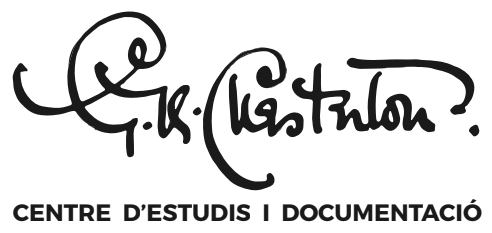Glossary
The glossary includes essential terms related to the person, life, and work of Chesterton. For reasons of space it must inevitably be incomplete. It includes the most important people – family, friends, contemporaries and adversaries -, the most significant places – streets, neighborhoods, buildings, literary, cultural and religious associations – and the most important public activities – conferences, debates, meetings, congresses , election campaigns and travel.
There are currently 14 terms in this directory beginning with the letter B.
Barcelona
The Chestertons went twice to Catalonia in 1926 and 1935; the first time they stayed at the Majestic Hotel on the Passeig de Gràcia; Gilbert gave a lecture in the Sala de Consells of Barcelona University titled “England as seen from abroad”; the PEN Club treated him to a gala dinner at the Ritz Hotel.
Baring, Maurice (1874-1945)
English man of letters; playwright, poet, novelist, translator and essayist; travel writer and war correspondent; though first an agnostic, he converted to Catholicism in 1909; during the First World War he served in the Intelligence Corps and the Royal Air Force; a personal friend of Gilbert, it seems he inspired the literary character of Horne Fisher, the protagonist of The Man Who Knew Too Much: And Other Stories (1922).
BBC (British Broadcasting Corporation)
On Christmas Day 1931, the BBC invited Chesterton for the first time to make a 15-minute transmission on Charles Dickens and Christmas addressed to the United States; in October 1932 a series of radio programmes on books were put forward to him; in January 1933 he completed a series of lectures on architecture; he held a public debate there with Bertrand Russell on education (1935); in June of the same year he completed a programme on freedom; the last programme, called The Spice of Life, was broadcasted in March 1936
Beaconsfield
Market town located in Buckinghamshire; Gilbert and Frances moved there for good from London in 1909.
Beerbohm, Max (1872-1956)
English essayist, cartoonist and parodist. In the 1890’s he was known as a humourist and a dandy; a friend of Chesterton’s since 1902, he drew several cartoons of Gilbert and Belloc.
Belloc, Hilaire (1870-1953)
Franco-British writer and historian; one of the most prolific writers in early-20th century England; he was also an orator, poet, sailor, satirist, letter writer, soldier and political activist; his Catholic faith had a strong impact on Chesterton, who was his personal friend since 1901. Bernard Shaw, referring to their friendship, complicity and affinity called them Chesterbelloc; Gilbert illustrated some of his novels.
Bentley, Edmund Clerihew (1875-1956)
English novelist and humourist; he invented the clerihew, an irregular form of witty verses concerning biographical subjects; he was Gilbert’s friend from his days in St Paul’s School; Chesterton illustrated his book Biography for Beginners (1905).
Blatchford, Robert (1851-1943)
English activist, journalist and socialist author; he stood out as an important atheist, nationalist and opponent to eugenics; he sustained a long dispute with Chesterton in the pages of The Clarion (1903-1904).
Blogg, Blanche (1848-1933)
Wife of George William Blogg (1842-1883); mother of Frances (1869-1938), Knollys (1871-1908), Ethel (1872-1953) and Gertrude (1875-1899); née Blanche Keymer.
Bookman, The
Monthly review dedicated to artistic and literary criticism, published by the Hodder & Stoughton group; in 1899, at University College London, Gilbert befriended Ernest Hodder Williams, who belonged to the family who owned it; thanks to him he starts contributing to it regularly with art reviews.
British Empire
The British Empire, lasting from the 16th to the 20th century, consisted of the territories politically and economically dependent on the Kingdom of Great Britain, and subsequently the United Kingdom of Great Britain and Ireland; at its height in the early 20th century, it held sway over a population of nearly 458 million people and some 33 million square kilometres, which represented approximately one fourth of the world population and two fifths of the land area (Source: Wikipedia); this immense political and economic power led to a great capacity for cultural influence, but also to diplomatic, social and military conflicts; the imperial idea, justified from a civilizing point of view, went into crisis and ran contrary to the industrialisation process and free trade encouraged by liberalism; the First World War was the bloody proof of the downfall of empires, even if the British one, having won the war, withstood until the mid-20th century.
Brompton Cemetery
Located on Fulham Road (Kensington, London); the cemetery where Beatrice (27 July 1878), Edward (18 May 1922) and Marie Louise (27 February 1933) are buried.
Brooke, Stopford (1832-1916)
Irish Cleric, royal chaplain and writer; in 1880 he broke away from the Church of England —for its adhesion to Unitarianism— as he didn’t accept its main dogmas, and he officiated as an independent preacher for some years in Bedford Chapel (Bloomsbury); Gilbert and Cecil went there with their parents to listen to Brooke’s famous sermons; his critical thinking influenced both brothers in drifting away from Unitarianism.
Brown, Father
Fictional character created by Chesterton; inspired by his friend Fr. John O’Connor, this detective priest is the most famous character from his literary work; his stories were published in the following volumes: The Innocence of Father Brown (1911), The Wisdom of Father Brown (1914), The Incredulity of Father Brown (1926), The Secret of Father Brown (1927), The Scandal of Father Brown (1935), "The Donnington Affair" (with Max Pemberton, 1914) and "The Mask of Midas" (1936); the stories have provided the base for several films and television series.
